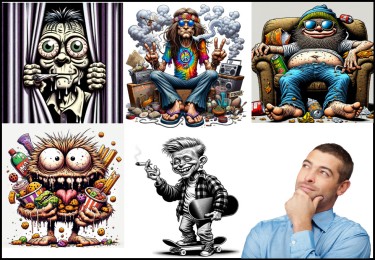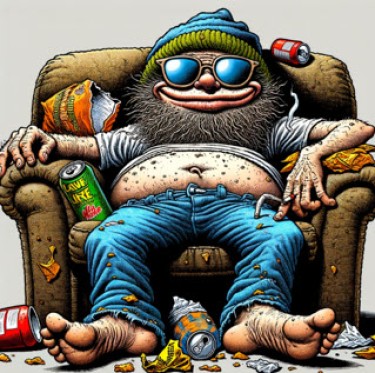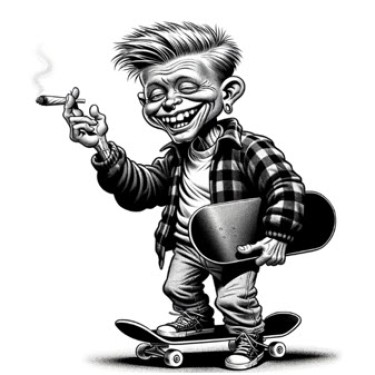
Exploring Five Negative Stereotypes of Marijuana
Stereotypes serve as a cognitive shortcut, allowing people to make rapid judgments based on limited information. While they can sometimes offer a grain of truth, more often than not, stereotypes oversimplify complex human behaviors and characteristics. In the realm of cannabis, stereotypes have played a significant role in shaping public opinion and policy, often weaponized by entities such as the state to further agendas of prohibition and control.
One of the most prominent examples of this weaponization is the D.A.R.E. (Drug Abuse Resistance Education) program, which emerged in the 1980s as a part of the broader “War on Drugs.” D.A.R.E. aimed to educate young people about the supposed dangers of drug use, including cannabis, but in doing so, it often relied on exaggerated and misleading portrayals of drug users. Cannabis consumers were depicted as lazy, unambitious, or even criminal, images that were designed to instill fear rather than foster understanding. These caricatures were not just harmless exaggerations; they played a pivotal role in justifying strict drug laws and harsh penalties for cannabis possession and use.
It’s crucial to acknowledge that some stereotypes about cannabis users contain a kernel of truth. Many stoners can attest to experiencing “munchies” or enjoying periods of relaxation and introspection that could be construed as laziness by outsiders. However, the effects of cannabis are diverse and subjective, and while a small minority of users may embody these stereotypes, the vast majority of cannabis consumers are as nuanced and unique as any other group.
Today, the demographic landscape of cannabis use has changed dramatically. Cannabis consumers span a broad spectrum of society, including professionals, creatives, and medical patients, challenging the outdated stereotypes that have long defined them. However, the legacy of these caricatures persists, continuing to influence perceptions and policies around cannabis.
To change the global perception of cannabis users, it’s essential to promote education and dialogue that highlights the diversity and complexity of cannabis culture. By showcasing the wide range of individuals who benefit from cannabis, whether for medical, recreational, or spiritual reasons, we can dismantle the stereotypes that have been weaponized against the community and pave the way for more informed and compassionate policies.
 The “Lazy Stoner” stereotype paints cannabis users as lethargic, unintelligent, and devoid of ambition. This caricature typically features individuals sprawled on couches, surrounded by snacks, seemingly stuck in a perpetual state of inactivity and disinterest in societal contributions. At its core, this stereotype stems from the idea that cannabis consumption leads directly to a lack of motivation, equating recreational or medicinal use with an inability to achieve or contribute meaningfully to society.
The “Lazy Stoner” stereotype paints cannabis users as lethargic, unintelligent, and devoid of ambition. This caricature typically features individuals sprawled on couches, surrounded by snacks, seemingly stuck in a perpetual state of inactivity and disinterest in societal contributions. At its core, this stereotype stems from the idea that cannabis consumption leads directly to a lack of motivation, equating recreational or medicinal use with an inability to achieve or contribute meaningfully to society.
In a capitalist framework, where productivity and constant activity are often equated with worth and morality, being labeled “lazy” is not just an observation; it’s a judgment. It implies that the individual is a drain on resources, someone whose lack of contribution necessitates extra effort from others. Thus, propagating the idea that cannabis induces laziness serves as a powerful tool to justify prohibition. It suggests that preventing cannabis use is not only about controlling an individual’s actions but also about protecting the collective work ethic and productivity of society.
However, this stereotype does not hold up under scrutiny. Far from the unmotivated slackers they’re painted as, cannabis users are often among the most hardworking and resilient individuals. Studies have shown that, on average, they take fewer sick days, exhibit a lower body mass index (BMI), engage in more physical activity, and can handle stressors more effectively than their non-using counterparts. Emerging research even suggests that cannabis may enhance empathy, further debunking the notion that users are disconnected or unengaged.
The label of “laziness” applied to cannabis users fails to recognize the plant’s diverse impacts on cognition and health. Cannabis affects individuals differently, enhancing some users’ lives significantly. While some people might use cannabis as an excuse for inactivity, for many, it’s a tool for wellness and productivity, challenging the stereotype of the “Lazy Stoner” as an outdated and unjustified cliché.
 The “Munchie Monster” stereotype is one deeply rooted in cannabis culture, often portrayed with a mix of humor and slight derision. It describes the seemingly uncontrollable urge to snack voraciously, particularly on unhealthy foods, after consuming cannabis. This stereotype paints a picture of indulgence, excess, and a lack of self-control, feeding into broader negative perceptions of irresponsibility and hedonism.
The “Munchie Monster” stereotype is one deeply rooted in cannabis culture, often portrayed with a mix of humor and slight derision. It describes the seemingly uncontrollable urge to snack voraciously, particularly on unhealthy foods, after consuming cannabis. This stereotype paints a picture of indulgence, excess, and a lack of self-control, feeding into broader negative perceptions of irresponsibility and hedonism.
Within a society that often values restraint and health-consciousness, the Munchie Monster can be seen as the antithesis of these ideals. It embodies the fear that cannabis use might not only alter one’s state of mind but also erode the willpower necessary to make healthy lifestyle choices. As a result, this stereotype can be weaponized to support prohibitionist narratives, suggesting that cannabis users are unable to govern their appetites and, by extension, their lives.
However, this stereotype fails to capture the complex reality of cannabis and its effects on appetite. While it’s true that certain cannabinoids can increase hunger signals in the brain, not all cannabis consumption leads to the munchies. Moreover, the type of food one craves can be influenced by individual preferences, habits, and awareness of health. Many cannabis users report craving and preparing nutritious foods like fruit smoothies or wholesome salads, contradicting the idea that munchies only involve junk food.
The munchies can also have positive implications, particularly for those who struggle with appetite due to medical treatments like chemotherapy. For these individuals, the munchie effect of cannabis acts as a crucial mechanism to maintain proper nutrition and body weight during challenging times.
In this light, the Munchie Monster stereotype is not just an unfair and oversimplified portrayal; it’s a perspective that lacks empathy and understanding of the medicinal benefits that cannabis can offer. It’s a narrative ripe for reevaluation, as we continue to understand more about cannabis and its place in our society.
 In the lexicon of stoner stereotypes, the “Perpetual Teen” stands out as a particularly poignant cultural caricature. It paints the picture of an adult whose lifestyle choices, behaviors, and interests have seemingly arrested in the halcyon days of adolescence. This stereotype draws on imagery of immaturity, an aversion to commitment, and an implied naivety due to a lack of worldly experience, suggesting a life led in perpetual pursuit of leisure and pleasure, akin to that of a carefree teenager.
In the lexicon of stoner stereotypes, the “Perpetual Teen” stands out as a particularly poignant cultural caricature. It paints the picture of an adult whose lifestyle choices, behaviors, and interests have seemingly arrested in the halcyon days of adolescence. This stereotype draws on imagery of immaturity, an aversion to commitment, and an implied naivety due to a lack of worldly experience, suggesting a life led in perpetual pursuit of leisure and pleasure, akin to that of a carefree teenager.
The Perpetual Teen is often portrayed as one who shirks responsibilities in favor of video games, skateboarding, or other activities traditionally associated with teenage culture. This stereotype aligns with a societal script that dictates a renouncement of such pastimes upon crossing the threshold into “adulthood.” To wear this label is to be seen as not quite fully formed, an individual whose opinions and rights are subtly deemed less weighty.
However, there’s a significant flaw in this reasoning. Personal freedom includes the right to choose one’s form of recreation and self-expression, regardless of age. If one can balance responsibilities and personal enjoyment, who is to say they must forsake all play for work? The stereotype of the Perpetual Teen starkly contrasts with the “mature adult” archetype, yet it fails to account for the diversity of adult life and the nuanced ways individuals find fulfillment.
In truth, many cannabis users embody the antithesis of this stereotype. They are responsible, hardworking, and successful, with families and careers that flourish alongside their cannabis use. My personal experience corroborates this; the Perpetual Teen stoner is a character I’ve yet to encounter in reality. Cannabis users are as varied as any demographic, with many breaking the mold entirely.
The “Paranoid Pothead” is a stereotype that has woven itself into the fabric of cannabis culture, casting a shadow of doubt and suspicion around the consumption of the herb. The image conjured is one of a user gripped by fear and anxiety, overly suspicious and jumping at shadows, often comically overreacting to benign situations. This stereotype plays into the narrative that cannabis inherently leads to heightened paranoia, suggesting a loss of rational control and a descent into irrational fear.
Indeed, some individuals may experience an increase in paranoia when consuming cannabis, often as a result of heightened sensory perception and altered thought processes. However, it’s crucial to note that this reaction varies widely among users, with many reporting a decrease in paranoia and an increase in relaxation and peace of mind after using cannabis.
Previously, the risk of legal repercussions played a significant role in fostering a sense of paranoia among cannabis users. The constant threat of arrest, coupled with aggressive government campaigns against cannabis use, made the fear of being caught a very real and rational concern. This state-induced paranoia was not a byproduct of the plant itself, but a response to an environment of criminalization and stigmatization.
As cannabis laws relax and societal acceptance grows, the stereotype of the Paranoid Pothead is becoming less relevant. Many users now consume cannabis without the looming fear of legal consequences, leading to a more relaxed and enjoyable experience. The stereotype fails to hold up in a world where cannabis is increasingly viewed as a staple part of society, and the once-common paranoia is now a relic of prohibition’s past.
Paranoia, when it does occur, should be seen as a potential side effect, not a defining characteristic of cannabis users. It is a complex interplay between the plant’s chemistry, individual psychology, and the external environment. Recognizing this nuance is key to dismantling the stereotype and appreciating the varied experiences of cannabis consumers.
The “Hippie Stoner” stereotype is one of the most enduring images within the cannabis culture tapestry, tracing its roots back to the 1960s counterculture movement. This stereotype is emblematic of peace, love, and a laid-back lifestyle, often associated with long hair, tie-dye apparel, and a free-spirited approach to life. The Hippie Stoner is portrayed as a figure deeply connected with nature, an advocate for social change, and a vocal opponent of establishment politics.
This image represents a time when the identity of the cannabis user was inextricably linked to the broader societal push against conventional norms and the search for greater meaning beyond material success. However, the Hippie Stoner also faces criticism for perpetuating the idea of perpetual adolescence, an unwillingness to ‘grow up’ and accept the responsibilities and commitments that come with adulthood.
Yet, it’s a stereotype that overlooks the individual’s right to self-identity and the joy in maintaining passions that inspire regardless of age. The ego, indeed, seeks to define itself through various molds and labels, and the Hippie Stoner becomes just one of many identities that an individual may adopt. But to reduce a person to a single aspect of their being is to ignore the multifaceted nature of the human experience.
The Hippie Stoner archetype is fading as the original generation ages, and newer, more nuanced identities emerge. Today’s cannabis enthusiasts are often more akin to “hipsters” than the hippies of yore. As such, those who still embody the classic Hippie Stoner persona are rarer, making them almost a cultural treasure—a reminder of a pivotal era in the history of cannabis.
In the end, what truly matters is not the stereotype, but the substance of one’s character. If one fulfills their duties and achieves their goals, their choice of lifestyle or leisure should be respected. The Hippie Stoner stereotype, much like others, fails to encompass the complexity and diversity of cannabis users, many of whom have shattered these dated molds to show that cannabis use is but one thread in the rich tapestry of their lives.
Stereotypes can be self-fulfilling prophecies, a psychological phenomenon known as the Pygmalion effect, where individuals unconsciously conform to the expectations and labels imposed upon them. This effect not only limits personal growth but also perpetuates societal norms that may be outdated or biased. It’s time to move beyond the simplistic categorization of people based on superficial traits or behaviors.
In an age that champions individuality and personal expression, it’s crucial to evaluate people on their own merits rather than the stereotypes they might superficially represent. Embracing nuance means acknowledging the multifaceted nature of human identity, where one can enjoy cannabis without embodying the clichés of a stoner. By dismantling our internalized stereotypes, we open ourselves to a more diverse and inclusive perspective, appreciating each person’s unique contributions to society. Let’s commit to seeing beyond the archetype, fostering an environment where everyone is free to define their own existence without the confines of labels.
- SEO Powered Content & PR Distribution. Get Amplified Today.
- PlatoData.Network Vertical Generative Ai. Empower Yourself. Access Here.
- PlatoAiStream. Web3 Intelligence. Knowledge Amplified. Access Here.
- PlatoESG. Carbon, CleanTech, Energy, Environment, Solar, Waste Management. Access Here.
- PlatoHealth. Biotech and Clinical Trials Intelligence. Access Here.
- Source: http://cannabis.net/blog/opinion/exploring-the-5-negative-stereotypes-about-marijuana-created-by-dare-in-the-1980s



